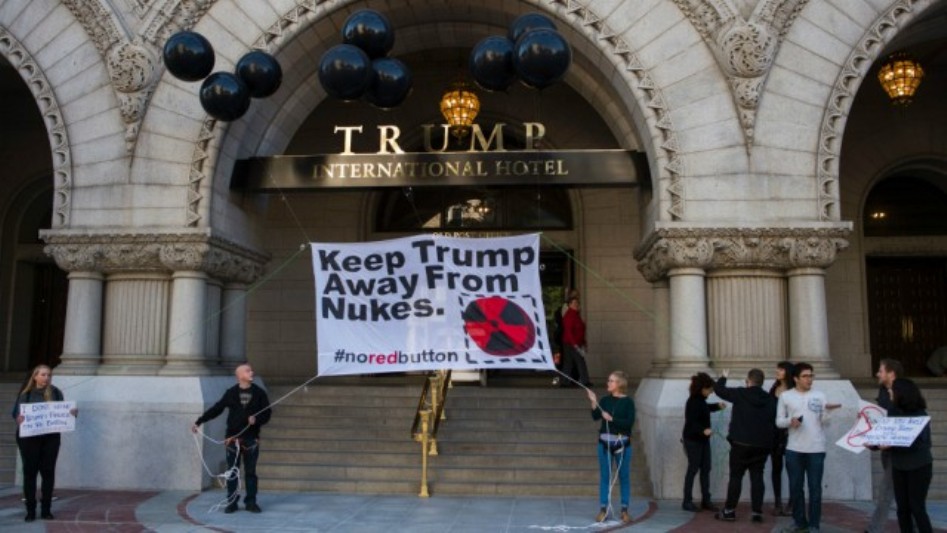
Trump alarms arms-control community with nuke tweet

The arms-control community is sounding the alarm on President-elect Donald Trump calling for the United States to "greatly strengthen and expand its nuclear capability.”
"This is a how arms races begin,” warned Joe Cirincione, president of nuclear nonproliferation group the Ploughshares Fund.
On Thursday afternoon, Trump tweeted that "the United States must greatly strengthen and expand its nuclear capability until such time as the world comes to its senses regarding nukes.”
A follow-up statement from spokesman Jason Miller said Trump "was referring to the threat of nuclear proliferation and the critical need to prevent it — particularly to and among terrorist organizations and unstable and rogue regimes.
The United States currently has about 7,000 nuclear warheads. The country is also in the midst of nuclear modernization efforts to replace the aging nuclear force, estimated to cost $1 trillion over 30 years.
The statement did not address what Trump meant by strengthen and expand.
The president-elect’s message prompted a flurry of tweets from everyone from arms control advocates to Hollywood.
"Trump
wants to expand our nuclear arsenal,” tweeted actor George Takei. "I
think of my aunt and baby cousin, found burnt in a ditch in Hiroshima.
These weapons must go.”
Arms-control groups said it was unclear what Trump meant by expanding and strengthening nuclear capability, but listed several possible scenarios: building more nuclear-capable systems than planned under the current modernization efforts, having nuclear-capable systems carry the maximum number of warheads possible, creating bombs with more kilotons of nuclear power and increasing the number of warheads in the nuclear arsenal, among other possibilities.
Though it remains unclear what prompted the tweet from Trump, the timing raised eyebrows for two reasons.
First, it came a day after Trump met with the chief executives of Boeing and Lockheed Martin, two of the country’s biggest nuclear weapons contractors. They are in competition, along with Northrop Grumman, to build the next generation of intercontinental ballistic missiles for the Air Force, a project expected to cost at least $85 billion.
Second, it came hours after Russian President Vladimir Putin made his own statement about strengthening his country’s nuclear arsenal.
"We need to strengthen the strategic nuclear forces, for that we should develop missiles capable of penetrating any current and prospective missile defense systems," Putin said at a Russian Defense Ministry meeting, according to Russian news agency TASS.
Neither Putin nor Trump have indicated the statements were coordinated or in response to one another, but arms control groups were alarmed that they came so close together.
"The U.S. and Russia have about 95 percent of all nukes in the world,” Cirincione said. "Everybody else pales in comparison. If two big guys start taking about growing, that’s a signal for every else to start their engines.”
Still, the Ploughshares Fund president said he thinks there could be a "flipside” to the leaders making similar comments around the same time.
Both Putin and Trump have indicated a desire to improve U.S.-Russia relations, and any agreement between the two countries would "almost certainly” include a reduction in nuclear weapons, he said.
"If Trump follows Reagan’s example, this could be the deal of his life,” Cirincione said, referring to President Reagan’s negotiations with Soviet Union leader Mikhail Gorbachev that led to the Intermediate-Range Nuclear Forces agreement and laid the groundwork for the Strategic Arms Reduction Treaty.
"This could be a statement of intent or it could also be preparing positions in advanced of negotiations,” Cirincione added. "Like everything else with Donald Trump, there are more unknowns than knowns.”
Derek Johnson, executive director of Global Zero, was more skeptical of an eventual agreement between the United States and Russia.
"It’s easy to imagine it not playing out that way, just based on how we’ve seen Trump conduct himself,” he said. "He’s deeply unpredictable, and this is not a space you want unpredictability.
"The No. 1 message here is this cause for serious alarm," he added.
Johnson interpreted Trump’s tweet as a "rapid response” to Putin.
He added that it validates the concerns people raised during the campaign about giving Trump access to nuclear weapons.
"I’m struck by the literally hundreds of national security leaders and experts, most of them Republican, who warned that this guy cannot be trusted with nuclear weapons,” he said. "This tweet suggests they were right.”
Kelsey Davenport, director of nonproliferation policy at the Arms Control Association, said the United States’ current modernization efforts are already "unnecessary and unaffordable,” and that expansion would make it worse.
"This not a direction the United States needs to be going now,” she said. "These comments coming from Putin are unsurprising based on Putin’s actions over the last couple months. What is unfortunate is Donald Trump entering into this same vein.”
John Tierney, executive director at the Center for Arms Control and Non-Proliferation, said it’s hard to discern nuclear policy from 140 characters, but called the tweet coupled with Putin’s comments "very, very troubling.”
Tierney said his group will be pressing the incoming administration for more clarity, as well as pressuring Congress to ask questions about the administration’s nuclear policies during confirmation hearings.
"It’s time for Putin and Trump to come to their senses,” he said.
"Between Russia and the United States, that’s 93 percent of the world’s nuclear weapons. That’s more than enough to deter each other and more than enough to destroy all of humanity.”















